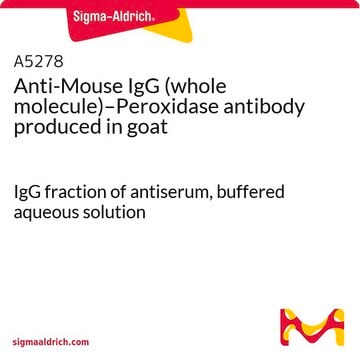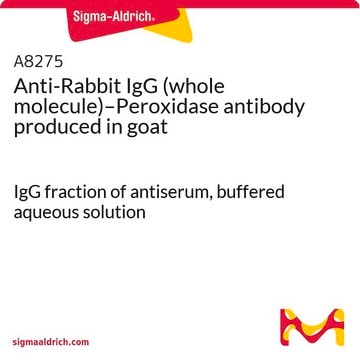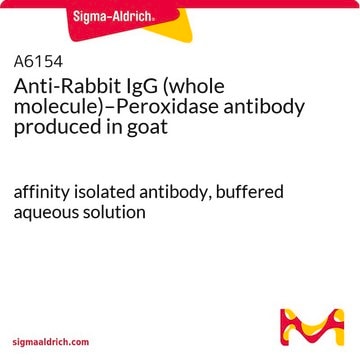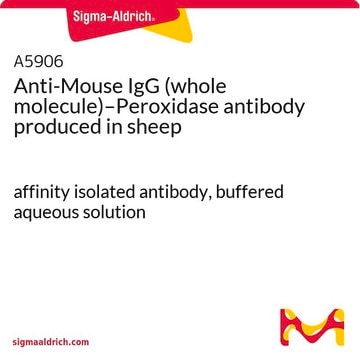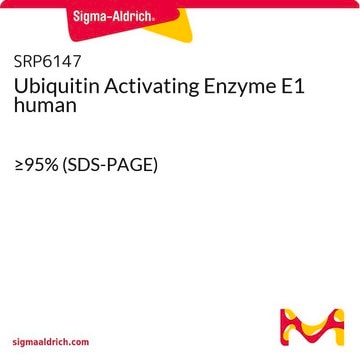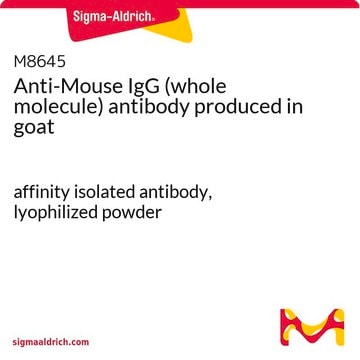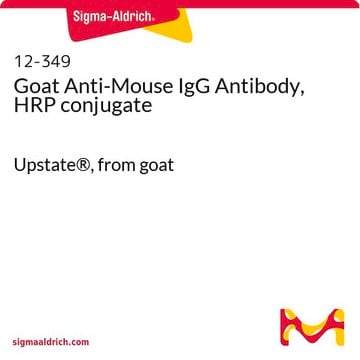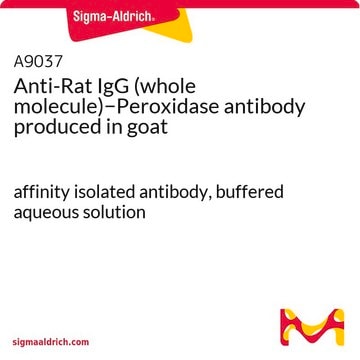A8924
Anti-Mouse IgG (whole molecule)–Peroxidase antibody produced in goat
affinity isolated antibody, buffered aqueous solution
Synonym(s):
Goat Anti-Mouse IgG (whole molecule)–Peroxidase
Sign Into View Organizational & Contract Pricing
All Photos(1)
About This Item
Recommended Products
biological source
goat
Quality Level
conjugate
peroxidase conjugate
antibody form
affinity isolated antibody
antibody product type
secondary antibodies
clone
polyclonal
form
buffered aqueous solution
species reactivity
mouse
should not react with
rat
technique(s)
direct ELISA: 1:10,000
shipped in
dry ice
storage temp.
−20°C
target post-translational modification
unmodified
Looking for similar products? Visit Product Comparison Guide
General description
Immunoglobulin G (IgG) is a glycoprotein antibody that regulates immune responses such as phagocytosis and is also involved in the development of autoimmune diseases. Mouse IgGs have four distinct isotypes, namely, IgG1, IgG2a, IgG2b, and IgG3. IgG1 regulates complement fixation in mice.
Goat Anti-Mouse IgG (whole molecule)-Peroxidase antibody binds to mouse IgG and does not react with rat serum proteins.
Goat Anti-Mouse IgG (whole molecule)-Peroxidase antibody binds to mouse IgG and does not react with rat serum proteins.
Immunogen
Purified mouse IgG (whole molecule)
Application
Anti-Mouse IgG (whole molecule)-Peroxidase antibody produced in goat may be used a secondary antibody in a direct ELISA, where the detection antibody is of mouse origin.
Goat Anti-Mouse IgG (whole molecule)-Peroxidase antibody has been used for ELISA (1:10,000) and immunoblot (1:2,500) analyses.
Other Notes
Antibody adsorbed with rat serum proteins.
Physical form
Solution in 0.01 M phosphate buffered saline, pH 7.4, containing 1% bovine serum albumin with preservative.
Preparation Note
A8924 anti-mouse IgG (whole molecule) peroxidase conjugate is an affinity isolated goat polyclonal antibody and was adsorbed with rat serum proteins.
Disclaimer
Unless otherwise stated in our catalog or other company documentation accompanying the product(s), our products are intended for research use only and are not to be used for any other purpose, which includes but is not limited to, unauthorized commercial uses, in vitro diagnostic uses, ex vivo or in vivo therapeutic uses or any type of consumption or application to humans or animals.
Not finding the right product?
Try our Product Selector Tool.
Signal Word
Warning
Hazard Statements
Precautionary Statements
Hazard Classifications
Aquatic Chronic 3 - Skin Sens. 1
Storage Class Code
12 - Non Combustible Liquids
WGK
WGK 2
Flash Point(F)
Not applicable
Flash Point(C)
Not applicable
Choose from one of the most recent versions:
Already Own This Product?
Find documentation for the products that you have recently purchased in the Document Library.
Customers Also Viewed
Miriam A Balderas et al.
Infection and immunity, 84(12), 3408-3422 (2016-09-21)
Bacillus anthracis is a sporulating Gram-positive bacterium that is the causative agent of anthrax and a potential weapon of bioterrorism. The U.S.-licensed anthrax vaccine is made from an incompletely characterized culture supernatant of a nonencapsulated, toxigenic strain (anthrax vaccine absorbed
C R Woodman et al.
Journal of applied physiology (Bethesda, Md. : 1985), 91(3), 1091-1098 (2001-08-18)
We tested the hypothesis that hindlimb unweighting (HLU) decreases endothelium-dependent vasodilation and expression of endothelial nitric oxide synthase (eNOS) and superoxide dismutase-1 (SOD-1) in arteries of skeletal muscle with reduced blood flow during HLU. Sprague-Dawley rats (300-350 g) were exposed
Mehmet I Cosacak et al.
Scientific reports, 7(1), 12959-12959 (2017-10-13)
Microtubule-associated TAU protein is a pathological hallmark in Alzheimer's disease (AD), where hyperphosphorylation of TAU generates neurofibrillary tangles. To investigate the effects of TAU in a regenerative adult vertebrate brain system, we generated a cre/lox-based transgenic model of zebrafish that
Cheryl de Vallière et al.
American journal of physiology. Gastrointestinal and liver physiology, 309(6), G475-G490 (2015-07-25)
The pH-sensing receptor ovarian cancer G protein-coupled receptor 1 (OGR1; GPR68) is expressed in the gut. Inflammatory bowel disease is typically associated with a decrease in local pH, which may lead to altered epithelial barrier function and subsequent gastrointestinal repair
Lukas Bossaller et al.
Journal of immunology (Baltimore, Md. : 1950), 197(4), 1044-1053 (2016-06-30)
Systemic lupus erythematosus (SLE) is a chronic, life-threatening autoimmune disorder, leading to multiple organ pathologies and kidney destruction. Analyses of numerous murine models of spontaneous SLE have revealed a critical role for endosomal TLRs in the production of autoantibodies and
Our team of scientists has experience in all areas of research including Life Science, Material Science, Chemical Synthesis, Chromatography, Analytical and many others.
Contact Technical Service

